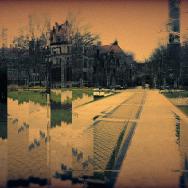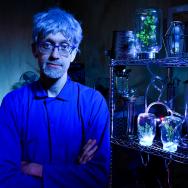A portal in the Regenstein Library. A rabbit hole to a mysterious alternate universe. Messages from the beyond—and the 1980s. This might seem like an alternate plot of Back to the Future, but you won’t find Marty McFly combing the library stacks. All of these elements were part of ECHO, the newest game launched by the University of Chicago’s Fourcast Lab.
Like previous alternate reality games developed by this team of interdisciplinary researchers, ECHO was created to engage new and returning students, and welcome them to the greater UChicago community. Unlike the previous games, ECHO had a second goal: to keep students safe during an unprecedented pandemic.
Throughout October, the game encouraged its participants to engage and connect while socially distant. But ECHO wasn’t premised on health and wellness alone. The story opened with transmissions from mysterious “echoes” that announced the appearance of a portal in Regenstein Library opening to an alternate version of our world. From the echo world, a Portal Program sent a message about a series of tests on Oct. 30—tests that would determine if “our side” can be trusted with portal technology.
“Purely educational games tend not to work well,” said Fourcast Lab member Patrick Jagoda, a professor of English and Cinema & Media Studies and director of the Weston Game Lab. “Instead, we wanted to embed safe and healthy behaviors within more engaging or creative quests.”
Led by six core members—Jagoda, Heidi Coleman, Ashlyn Sparrow, Marc Downie, Kristen Schilt and Ben Kolak—the Fourcast Lab designed quests in conjunction with UChicago faculty. The quests varied from baking cookies, to creating a comic book, to writing a song using an unusual instrument.
They were organized around four key themes: reinforcing behaviors for students, staff, and faculty outlined in the UChicago Health Pact; experimenting with remote teaching techniques; promoting student wellness both physically and mentally; and, finally, connecting the UChicago community to staff and faculty by highlighting their research, interests, or art practices. To bolster the student wellness elements of the quests, the Fourcast Lab consulted medical professionals, including Assoc. Prof. Emily Landon of UChicago Medicine.
The initial “rabbit hole” style puzzle which launched ECHO on Instagram saw over 4,000 total visits in 36 hours. Participants ranged from current UChicago students to Halo creator and alum Alex Seropian, SB’91, who played alongside his daughter.
Part of ECHO’s appeal mirrored that of another campus tradition: Scav Hunt. Like UChicago’s storied annual four-day scavenger hunt, ECHO tapped into its participants’ creativity and desire to collaborate, fostering cooperation among team members. “I loathed group projects growing up, because people never did their fair share,” said Somaiyya Ahmad, a member of ECHO team Quantum Leap and a staffer in the Office of the Provost. “My experience with this group project was completely different. Everyone was clamoring to do more to help ... I loved it.”
For Mahmoud Yousef, captain of Pritzker Scrubs, a team of first-year medical students, the game helped him get to know his peers in ways that hadn’t been possible because of COVID-19. “I haven’t been able to meet most of my classmates outside of Zoom lectures,” he said. “With ECHO, we were able to get past the ‘breaking the ice’ stage and actually work together on something that is completely outside of academics.”
Some quests explicitly asked participants to reflect on the COVID-19 pandemic—but to imagine their perspective from the future. “It’s difficult to gain critical distance when you’re in the middle of a situation,” said Jagoda. “So we tried to defamiliarize the COVID-19 pandemic by thinking back to the 1918 influenza pandemic, and then asking people to speculate about a possible future engaging with our present.” In total, UChicago faculty and staff created over 24 challenges.
In the face of the COVID-19 crisis, said Sparrow, ECHO became “an interesting challenge for people to stay safe, have fun, but also think about what they can do for others.” The assistant director of the Weston Game Lab, Sparrow delivered a challenge that asked teams to create a text-based game using Twine, an open-source storytelling platform. Pritzker Scrubs took the prompt to heart, creating a game that explained COVID-19 from a novel, interactive angle: the perspective of the virus. “It relies a lot on logic—what decision do you make in order to infect as many people as possible?” Yousef said. “In the end, we see the strengths and weaknesses of the virus, which we hope teaches people how to use that to their advantage and protect themselves and their communities.”
ECHO culminated in a livestream event, gathering every member of the 52 teams to follow Ava Tarkovska, the lead character who first “discovered” the library portal 40 years ago. Beginning as a choose-your-own-adventure game, Tarkovska navigated up and down Regenstein Library according to the collective choices of the participants—making necessary pit stops for Purell along the way. The livestream also stirred nostalgia, as players’ comments populated the screen:
“I miss those stairs!”
“Can we make a pit stop in Special Collections?”
“Let’s go to Mansueto!”
Eventually, with all quests completed through intense, collaborative game play, ECHO players were able to make contact with the alternate dimension. And with that, ECHO was over. The relationships built through weeks of game play, however, will last longer than the game.
“My teammates are now really close friends,” said Youssef. “We shared many memories with each other that we will keep forever.” Mary Pat McCullough, a staff member at the Pritzker School of Molecular Engineering who captained the ECHO-winning Quantum Leap team, summed up the experience simply: “The key to our success was a team commitment to each other.”

